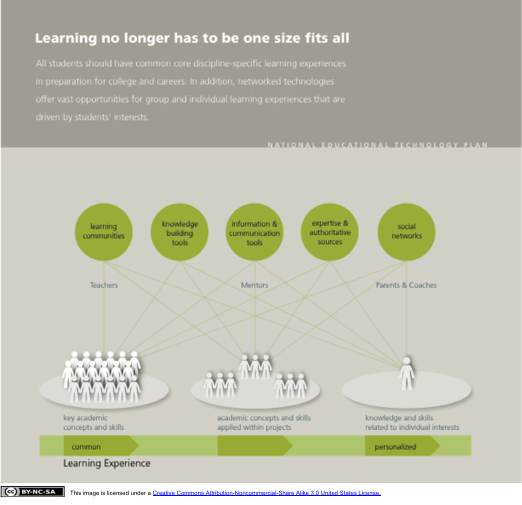But It Sounds Pretty
3 min read
In reading through the draft of the National Educational Technology Plan, I like the goals.
As one example, this page contains a graphic titled, "Learning no longer has to be one size fits all."

(Just FYI, the un-clickable link to the Creative Commons license in the above graphic is the work of the technology people behind the technology plan. That's not my doing. The image appears to be licensed under a CC-NC-SA license)
Further down the same page, it reads:
Technology also gives students opportunities for taking ownership of their learning. Student-managed electronic learning portfolios can be part of a persistent learning record and help students develop the self-awareness required to set their own learning goals, express their own views of their strengths, weaknesses, and achievements, and take responsibility for them.
This sounds great, but it just doesn't seem to align with the way that the Common Core standards are being forcibly injected into the educational landscape.
The plan also talks about Open Educational Resources. Secretary Duncan mentions OER's in a speech he gave on March 3, 2010 at the Association of American Publishers annual meeting:
Our commitment to Open Educational Resources includes a commitment to you: that they will be fully open, including open to commercial producers of learning materials who want to add value to these resources and sell enhanced, proprietary versions.We see this step as both an investment in our students and an opportunity for your industry.
In practical terms, this means that textbook companies will be able to take resources that have been created using public funds, modify them slightly, and voila, the derivative works are no longer freely available. That's a very generous way to subsidize a dying industry. One way of reading this: textbook companies can spend less on developing texts, as they will be able build textbooks using the curriculum and assessments we will pay to get developed as part of Race to the Top/ESEA. Interestingly, as noted earlier in this post, the Department of Education uses the less restrictive Non-Commercial license for its graphics.
So, while the technologist/open source developer/open content advocate in me wants to be excited, the educator in me feels skeptical. The approach to the current Ed policy feels like a series of political calculations, wrapped in the almost obligatory "But think about the children" rhetoric. The actions -- and, more importantly, the funding strategies -- feel misaligned with the stated goals.
In the Executive Summary, it states:
The programs and projects that work must be brought to scale so every school has the opportunity to take advantage of that success.
It's difficult to see how unfunding the National Writing Project -- a program that works, that scales, and supports teachers as they develop resources in their local communities, and has been on the leading edge of technology use -- aligns with this goal.
The rhetoric around education policy has yet to line up with the effects of this policy.


